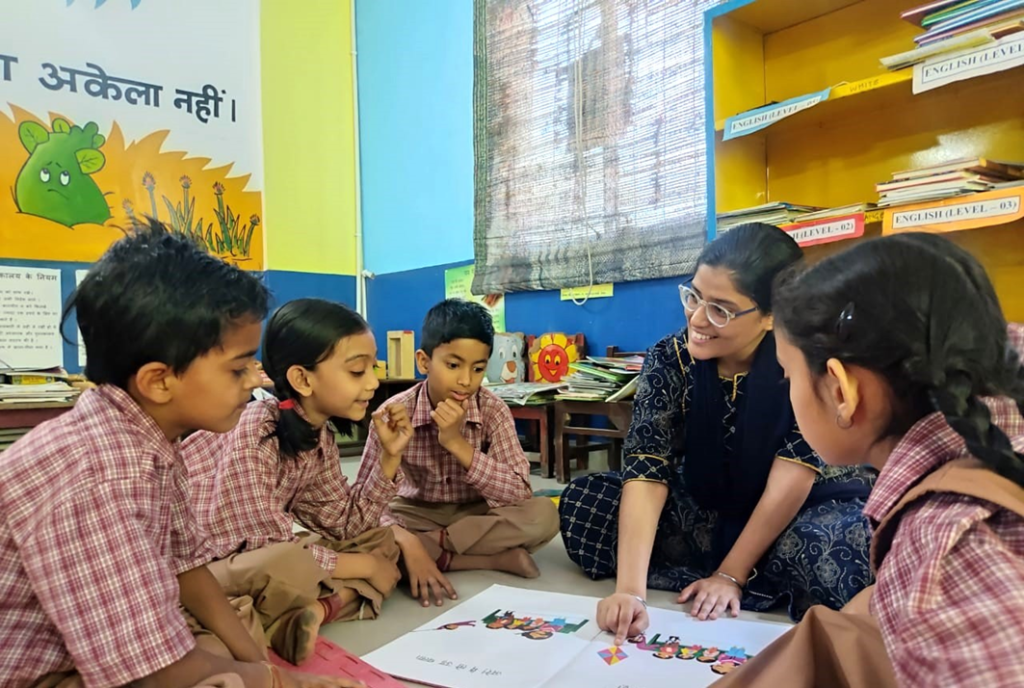
I grew up in a joint family in West Delhi (Tilak Nagar). My mother taught in a school, and my father was a trained carpenter and a blacksmith. From an early age, I saw my parents, uncles, aunts, and other family members working very hard to make ends meet. But, despite all the struggles and hardships, my family always maintained a state of ‘Raza’ (feeling of contentment and embracing everything as God’s will). I believe that had a significant impact on me. My family taught me to value little things, such as how to coexist with people, respect and support them. They provided me with a secure and nurturing environment that shaped my identity as an adult.

I never intentionally planned to become a teacher. My mother planted the seed of love for teaching inside me subconsciously. While growing up, I would watch and imitate her. I would put on a saree, hold a book in one hand, chalk in another, and pretend and play teacher-teacher for hours. This love for teaching was further cemented by a degree in Elementary Education, which also opened many windows of opportunities for me. My enriching experience during my graduation journey also taught me a lot about the Indian education system. Why it needs reform? How we need to make it more inclusive and focussed on critical thinking.
When children enter into a formal schooling system at grade one, the in-between challenges they face and what they receive at the end of schooling reveal a lot about our education system. See, I am not here to change anything radically, but I feel children learn from teachers they like—the ones who can bring a smile to their faces and connect with them on a real, human, personal level. And so, as I embarked on my journey to become a teacher, this eventually became a bigger goal for me.
In 2018, I got an opportunity to work with Swami Sivananda Memorial Institute of Fine Arts & Crafts as an intern. My role was to conduct storytelling sessions and theatre exercises with the students. Little had I known that this would be a life-changing experience for me. I connected with my students so well that I started looking forward to the class daily. They seem to enjoy it as well. Shortly after a year, I joined SSMI full-time as a remedial educator and taught a group of 20 – 22 students. During the pandemic, when people were losing their jobs, the management of SSMI bestowed me another opportunity. I started coordinating a project that included leading a team of Hindi and Social science teachers. Currently, I am the Project coordinator of the Special Needs and Remedial Education Program at SSMI.

Remedial education is often confused with special education, but the critical difference between both is that while special education is explicitly focused on children with special needs, remedial education can be designed for students with or without special needs. Although the project title has the word ‘special needs’ in it, I generally deal with remedial kids. They are kids who struggle with essential reading and arithmetic skills. They lack motivation toward learning, cannot grasp abstract ideas, and face difficulty in problem-solving. They have lower self-confidence, and they are slow learners.
This year I will complete four years as a teacher. My experience may be little, but I have gained a fair understanding of how the Indian education system operates. Even though institutions here are striving to achieve high-quality education, there are gaps at the fundamental level. And these gaps are not specific to one particular institution, such as SSMI. The overall approach to learning requires course correction. The traditional style of teaching, emphasis on rote memorization, lack of parental involvement, conventional ways of assessing children, one size fits all approach are some of the gaps that should be addressed.
When I walk into my class, I let my students lead their learning. It’s time we transform outdated teaching-learning practices and empower students instead of burdening them. Many children lose their love of learning because they associate it with anxiety and pressure. Instead of supporting and encouraging them, we expect them to behave, think and act in a certain way. Learning is a process. It’s a transition. However, sadly we make it only about outcomes.
We need to change this approach. Help students be equal stakeholders in the teaching–learning process, give them room for error and experimentation, and make the entire activity more conversational. Do all of that, and you won’t be surprised to see how much their love of learning grows.


